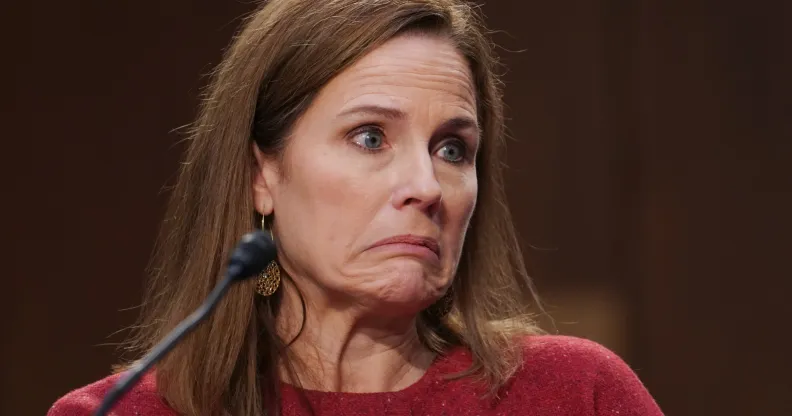Supreme Court nominee Amy Coney Barrett makes the limpest of apologies for saying being LGBT+ is a ‘preference’

Supreme Court nominee Judge Amy Coney Barrett reacts as she testifies before the Senate Judiciary Committee on the second day of her Supreme Court confirmation hearing. (Sarah Silbiger-Pool/Getty)
Donald Trump’s Supreme Court pick Amy Coney Barrett has apologised for using an outdated term to suggest that being LGBT+ is a choice.
Amy Coney Barrett sparked outrage Tuesday (13 October), the second day of her confirmation hearings, while responding to questions on Obergefell v Hodges, the landmark 2015 Supreme Court ruling which legalised same-sex marriage across America.
Refusing to say whether marriage equality is a constitutionally protected right, she falsely claimed: “I have never discriminated on the basis on the basis of sexual preference and would never discriminate on the basis of sexual preference.”
It’s not a sexual “preference,” Judge Barrett. A preference is something you choose. I’ll give you and example: “I have a preference for non-radical, non-fundamentalist justices on the Supreme Court.” Are we clear?
— George Takei (@GeorgeTakei) October 13, 2020
The outdated phrase “sexual preference” suggests being queer is a “choice”, and her answer increased fear among LGBT+ Americans that Barrett’s confirmation could put marriage equality in jeopardy.
My *preference* is that the winner of this presidential election should choose the next justice.— Pete Buttigieg (@PeteButtigieg) October 13, 2020
Later during the hearing, Democratic Hawaii senator Mazie Hirono read a statement to Barrett, explaining these fears.
She told her: “Not once but twice you used the term ‘sexual preferences’ to describe those in the LGBT+ community.
“Let me make clear, ‘sexual preference’ is an offensive and outdated term. It is used by anti-LGTB+ activists to suggest that sexual orientation is a choice. It is not.”
Hirono continued: “That sexual orientation is both a normal expression of human sexuality and immutable was a key part of the majority’s opinion in Obergefell. Which, by the way, Scalia did not agree with.”
Barrett’s anti-LGBT+ mentor, the late Supreme Court justice Antonin Scalia, wrote a dissenting opinion against Obergefell v Hodges. He also openly compared the rights of gay people to paedophiles and incest.
Still refusing to say whether she believed equal marriage was a constitutional rights, Barrett was forced to apologise for the homophobic term.
She said: “I certainly didn’t mean and would never mean to use a term that would cause any offence in the LGBT+ community.
“If I did, I greatly apologise for that. I simply meant to be referring to Obergefell‘s holding with regard to same-sex marriage.”
Barrett added that she had refused to answer questions on equal marriage for the same reasons she refused to answer questions on other issues, like abortion.
“I was certainly not indicating disagreement with it,” she said.
“The point of not answering was to simply say it was inappropriate for me to say a response.”

